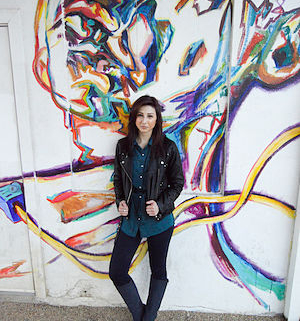Before Spring, XXXV., Advent, & Omega
[translated poetry]
Before Spring
A strange sound wakes you.
Your heart? Your stomach? Just the pipes.
Two-thirty in the morning. A pale lane
of light pollution looms between the high rises
on the horizon. Above it, a thin
strip of sky. Like clumps of minerals
in a newly discovered mining cavity,
dim stars shine. The night swallows the minutes’
mine carts, the years. And it all stays down
in the deep forever. The past tears away,
like a quarry’s steep cove.
Cold water. A few movements. Hands.
What you think about, longingly and full of surrender,
is what has already come to pass.
And suddenly, you recognize—a few elementary
words, a child’s outfit—this was your life.
XXXV.
The direction of the winds has changed.
In place of the rotting smell of salty
Seaweed, drifts the resin aroma
Of the almond trees. In summer’s
Dense company, wavy
Watered-down death shines.
It’s easy to spot the city’s spires.
Like faint female figures,
They stand there, and their dresses,
Sewn from leaden steam,
in this flammable moment,
drop to their ankles.
Advent
My friend and I were sitting at a bar
drinking dark beer and whiskey,
watching the sluggish bartender behind the taps.
The beer wasn’t bothered by anything, the beer would’ve run
over the rims of glasses,
over the rims of mouths;
but the guy was slow, patient, persistent—
he waited. He tamed the golden
brown animal before him.
We were sitting at the bar, my friend and I,
counting down the past,
change hitting the glass,
We meditated on the future,
brought up an old mutual friend,
how he’d lost his way, messed up, doesn’t stand a chance.
We finally stepped out onto the street, drunk.
And steaming there before us on the sidewalk
on that November night was a pile of shit.
Human or animal? It didn’t matter.
It doesn’t matter. “You going
home?” “I’m going.”
We shook hands, headed home
in two directions.
It was cold. Foggy.
Winter had already dressed up and was waiting
patiently backstage.
I walked. I was cold. I fished out a cigarette.
When the flame of the lighter came to life,
I thought about how that pile of shit on the sidewalk
in front of the bar was probably frozen by now.
And while I shivered and blew smoke
and my steps knocked along the sidewalk,
I thought about what it was
that kept you with me so long,
and if I haven’t turned yet, what will turn
me against you in the end.
Omega
Street lamps on the closing curve,
off-white silk skirts
swish. It’s midnight.
Growing claws, tomorrow hangs
onto yesterday.
The city laid out after rain
like a freshly washed corpse.
Love’s not enough for anything.
It does not turn deceit good.
It does not obstruct spite.
It does not ease death.
There has to be something else
beyond love.
![]()
Tavasz előtt
Valami különös neszre felriadsz.
A szív? A gyomor? Csak a vízvezeték.
Hajnali fél három. A fényszennyezés
sápadt sávja dereng a toronyházak közt
a látóhatáron. Fölötte keskeny
szelet égbolt. Mint frissen feltárt
bányaüregben az ércrögök, fakó csillagok
ragyognak. Az éjszaka elnyeli a percek
csillesorát; az éveket. És mind lent marad
a mélyben örökre. A múlt leszakad,
mint egy bányató meredek öble.
Hűvös víz. Pár mozdulat. Kezek.
Arra gondolsz, vágyakozva és lemondással
teli, ami előtted már alászállt.
És hirtelen felismered – néhány kezdetleges
szót, egy gyerekruhát –, hogy ez volt az életed.
XXXV.
Megváltozott a szélirány.
A hínárok sós rothadásszaga
Helyett a mandulafenyők
Gyantaillata száll. A nyár
Tömör közegében hullámzó,
Híg halál ragyog.
Jól látni a város tornyait.
Mint halovány nőalakok,
Állnak, és ólomgőzből
Szőtt ruhájuk,
E lobbanásszerű percben,
Bokáig lehull.
Advent
Ültünk egy barátommal egy bárban,
barna sört ittunk, whiskyt és
figyeltük a lomha pultosfiút a sörcsapok mögött.
A sört nem érdekelte semmi, a sör futott
volna, túl a poharak száján,
túl a szájakon;
de a fiú lassú volt, türelmes, állhatatos –
kivárt. Megszelídítette ezt az aranyló
barna állatot.
Ültünk a pultnál, a barátom és én,
számoltuk le a múltat,
aprópénzt a pultra,
latolgattunk jövőt, és egy közös
barátról is szó esett,
hogy ő mennyire félrement, elrontotta, esélye sincs.
Kiléptünk az utcára végül, részegen.
És ott gőzölgött, a novemberi éjszakában,
a járdán egy kupacnyi szar.
Emberé vagy állaté lehet? Nem számított.
Nem számít. „Mennél már
haza?” „Megyek.”
Kezet ráztunk, és – ketten kétfelé –
elindultunk haza.
Hideg volt. Köd.
Már felöltözött a tél, és türelmesen
ácsorgott a színfalak mögött.
Gyalog mentem. Fáztam. Előkotortam egy cigit.
Mikor az öngyújtó lángja föllobbant,
Eszembe jutott, hogy mostanra talán
a bár előtt, a járdán az a kupac szar már megfagyott.
És míg reszketve fújtam a füstöt,
és a léptem kopogott,
arra gondoltam, mi volt,
ami megtartott eddig neked,
és ha nem fordultam el, mi fordít
végül mégis ellened.
Ómega
Utcalámpák a záródó kanyaríven,
törtfehér selyemszoknyák
suhognak. Éjfél van.
Karmot növeszt, kapaszkodik
a tegnapba most a holnap.
Kiterítve eső után a város,
mint egy frissen mosdatott halott.
A szeretet nem elég semmire.
Nem teszi jóvá az árulást.
Nem akadályozza a haragot.
Nem könnyíti meg a halált.
Valaminek kell még lennie
a szereteten túl.
Translator’s Statement:
I first came across some of these poems at a reading Babiczky gave in Budapest in the winter of 2017 that I attended, several months before Unfinished Poems, the collection in which these poems appear, was published. I was instantly pulled in by the cold, seasonal imagery of the first poem Babiczky read, “Advent.” It was winter outside, the first winter I’d spent in Budapest since I left the country as a child. I was also discovering the city on my own for the first time after leaving a relationship that summer that was immensely important to me. I was still nursing old wounds in Budapest, and the last few weeks I’d spent in the chilly city helped me to easily identify with the speaker as he who walks through the frozen streets of Budapest meditating on what it will take for his feelings to change about his ex-lover.
By the time Babiczky made it to the end of “VII.,” a poem about his mother’s days on the Balaton shore as a young woman, I was visibly sobbing. My mother, who likewise spent many summers of her youth on the Balaton shore, often questions her decision to have left her home country behind for America, and later, in looking over my first draft of the translation, admitted that she also cried when she read “VII.” I know I must translate a Hungarian work into English when it speaks to me on an emotional level, and often that helps me to bring it more seamlessly into English, but that is not always the case. In translating these poems, however, I needed simply to find and latch on to the emotional tenor of each piece to bring them into English. The process was surprisingly quick, when, in fact, I wished I could have stayed in the poems longer, revel in the deep emotions each one strikes. Babiczky and I spoke a few times, once even in person, about the translations, and his feedback was immensely helpful, particularly in maintaining the sounds, rhythms, and occasional rhymes of certain of the poems.


 Timea Balogh is a Hungarian-American writer and translator with an MFA in creative writing from the University of Nevada, Las Vegas. A 2017 American Literary Translators Association Travel Fellow, her translations have appeared or are forthcoming in The Offing, Two Lines Journal, Waxwing, Split Lip Magazine, Arkansas International, and the Wretched Strangers anthology from Boiler House Press, among others. Her debut original short story was published in Juked magazine and was nominated for a PEN/Robert J. Dau Short Story Prize for Emerging Writers. Another of her stories is soon to appear in Passages North. She divides her time between Budapest and Las Vegas. You can tweet her at @TimeaRozalia.
Timea Balogh is a Hungarian-American writer and translator with an MFA in creative writing from the University of Nevada, Las Vegas. A 2017 American Literary Translators Association Travel Fellow, her translations have appeared or are forthcoming in The Offing, Two Lines Journal, Waxwing, Split Lip Magazine, Arkansas International, and the Wretched Strangers anthology from Boiler House Press, among others. Her debut original short story was published in Juked magazine and was nominated for a PEN/Robert J. Dau Short Story Prize for Emerging Writers. Another of her stories is soon to appear in Passages North. She divides her time between Budapest and Las Vegas. You can tweet her at @TimeaRozalia. Tibor Babiczky was born in Székesfehérvár, Hungary, in 1980. He earned degrees in Hungarian and English from Pázmány Péter Catholic University in 2005. He has worked as a journalist, editor of a literary magazine, and a book editor, which he still does today for the Hungarian publishing company Libri. He has been twice nominated for a Horváth Péter Literary Grant, a Margó Grant, and is the winner of the Móricz Zsigmond Grant. His poems have been translated into English, Czech, French, Greek, Croatian, and Polish. Tibor has published six poetry collections and one crime novel. The poems submitted here are all drawn from his latest poetry collection, Félbehagyott Költemények (Unfinished Poems), which hit bookshelves in the spring of 2018.
Tibor Babiczky was born in Székesfehérvár, Hungary, in 1980. He earned degrees in Hungarian and English from Pázmány Péter Catholic University in 2005. He has worked as a journalist, editor of a literary magazine, and a book editor, which he still does today for the Hungarian publishing company Libri. He has been twice nominated for a Horváth Péter Literary Grant, a Margó Grant, and is the winner of the Móricz Zsigmond Grant. His poems have been translated into English, Czech, French, Greek, Croatian, and Polish. Tibor has published six poetry collections and one crime novel. The poems submitted here are all drawn from his latest poetry collection, Félbehagyott Költemények (Unfinished Poems), which hit bookshelves in the spring of 2018.


